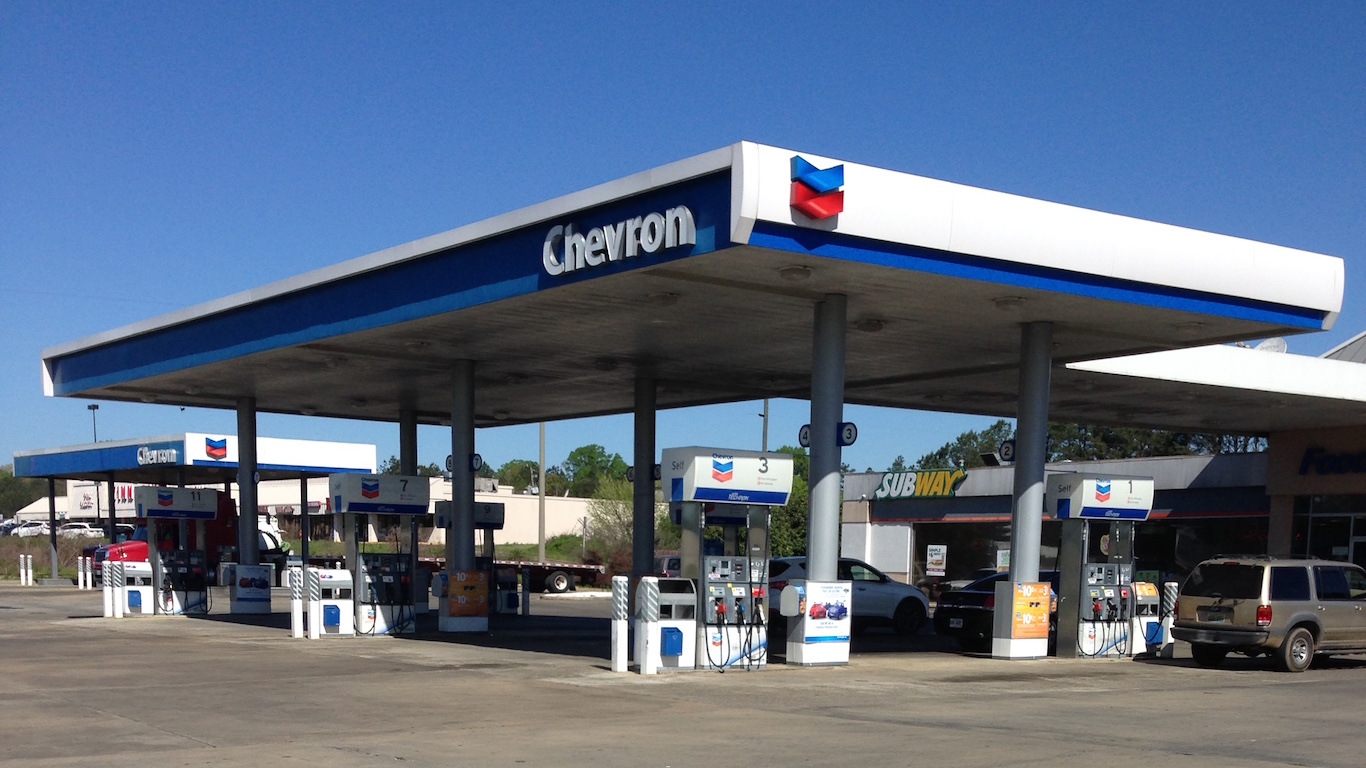
When Chevron Corp. (NYSE: CVX) reported third-quarter results before markets opened Friday morning, the oil and gas supermajor posted diluted earnings per share (EPS) of $1.36 on total revenues of $34.78 billion. In the same period a year ago, the company reported EPS of $2.11 on total revenues of $42.1 billion. Third-quarter results also compare to the consensus estimates for EPS of $1.45 and $37.69 billion in revenues.
Net income for the most recent quarter totaled $2.58 billion, compared to net earnings of $4.05 billion in the year-ago quarter. Upstream earnings fell 36% from $3.38 billion to $2.7 billion, while downstream earnings fell nearly 40% from $1.37 billion to $828 million.
The U.S. upstream segment posted earnings of $727 million, compared with $828 million compared in the year-ago quarter. International upstream posted a profit of $ 1.98 billion, compared with $2.55 billion last year. U.S. downstream (refining and marketing) earnings fell from $748 million a year ago to $389 million, and international downstream earnings dipped from $625 million to $439 million.
A one-time tax charge for repatriated cash nicked profits by $430 million, and currency exchange effects boosted earnings by 3%.
U.S. capital spending totaled $2.53 billion in the quarter and $7.54 billion for the first nine months of 2019, while international capex saw a quarterly total of $2.43 billion, along with year-to-date spending of $7.44 billion. Worldwide capital expenditures totaled $15.98 billion for the first three-quarters of the year, up 4.4% compared with the same period a year ago.
Net oil-equivalent production in the first quarter totaled 3.03 million barrels a day, up by 40,000 barrels a day compared with the year-ago quarter. Net oil-equivalent production in the United States totaled 934,000 barrels a day, up by 103,000 barrels year over year. Average U.S. price realizations per barrel of oil dropped from $62 a year ago to $47.
Internationally, liquids prices fell from $69 a barrel a year ago to $56 a barrel, and net oil-equivalent production fell by 26,000 barrels a day to 2.1 million barrels.
CEO Michael Wirth said:
Third quarter earnings and cash flow were solid, but down from our very strong results of a year ago. Lower crude oil and natural gas prices more than offset a 3 percent increase in net oil-equivalent production from last year’s third quarter. Strong execution allows us to continue to deliver on our financial priorities, which are to pay the dividend, fund our superior portfolio of capital projects, further strengthen our balance sheet and return cash to shareholders.
The earnings announcement did not include guidance, but consensus estimates for the fourth quarter of 2019 call for earnings per share of $1.61 on revenues of $38.64 billion. For the full year, earnings per share and revenues are estimated at $6.45 and $152.35 billion, respectively.
Like its fellow supermajor Exxon Mobil, Chevron suffered from low crude oil prices and slowing global economic growth. Unlike Exxon, however, Chevron failed to meet or beat expectations on a drastically lowered bar, and that weighed somewhat on shares Friday.
Chevron’s shares traded down fractionally to $115.58 after almost an hour of trading, in a 52-week range of $100.22 to $127.34. The consensus 12-month price target was $137.46 before this morning’s report.
It’s Your Money, Your Future—Own It (sponsor)
Retirement can be daunting, but it doesn’t need to be.
Imagine having an expert in your corner to help you with your financial goals. Someone to help you determine if you’re ahead, behind, or right on track. With SmartAsset, that’s not just a dream—it’s reality. This free tool connects you with pre-screened financial advisors who work in your best interests. It’s quick, it’s easy, so take the leap today and start planning smarter!
Don’t waste another minute; get started right here and help your retirement dreams become a retirement reality.
Thank you for reading! Have some feedback for us?
Contact the 24/7 Wall St. editorial team.




